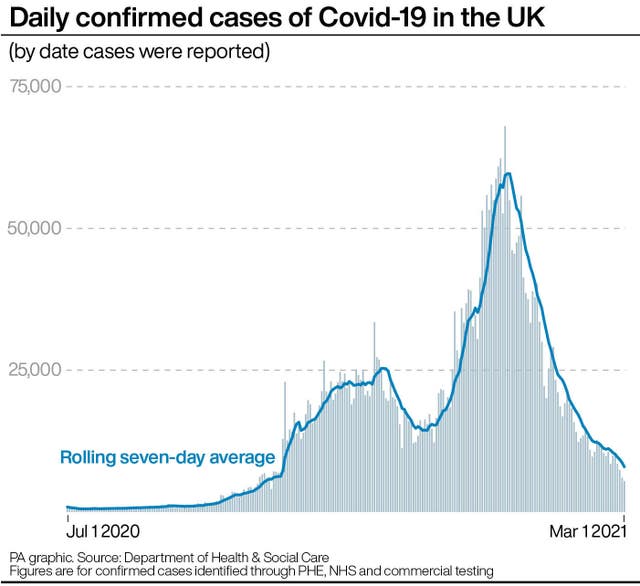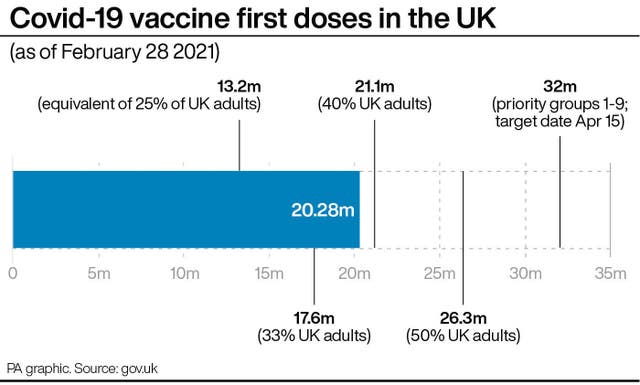Hancock tells Britons to follow Covid rules despite ‘exciting’ vaccine data
A study by PHE indicated that the Pfizer and Oxford-AstraZeneca vaccines are highly effective in reducing infections among older people.

Matt Hancock has urged Britons not to break coronavirus rules and “blow” progress, despite “exciting” data suggesting the two vaccines being used in the UK reduce hospital admissions in over-70s by 80%.
The Health Secretary said jabs were already helping to save lives, as he heralded the study by Public Health England which indicated that the Pfizer and Oxford-AstraZeneca vaccines are highly effective in reducing infections among older people.
Mr Hancock said the number of admissions to hospital was falling faster than that of cases – particularly among the older age groups who were vaccinated first. “This is a sign that the vaccine is working,” he said.
He told a Downing Street press conference that people must “keep sticking to the rules, let’s not blow it now” – but said the new data shows “in the real world, across the UK right now that the vaccine is helping both to protect the NHS and to save lives”.
“A single shot of either the Oxford/AstraZeneca vaccine or of the Pfizer vaccine works against severe infection among the over-70s with a more than 80% reduction in hospitalisations”, Mr Hancock said.
“In fact, the detailed data show that the protection that you get from catching Covid 35 days after a first jab is even slightly better for the Oxford jab than for Pfizer, albeit both results are clearly very strong.”
The results “may also help to explain why the number of Covid admissions to intensive care units among people over 80 in the UK have dropped to single figures in the last couple of weeks”.

England’s deputy chief medical officer Professor Jonathan Van-Tam added that data for the Pfizer vaccine shows the likelihood of mortality is reduced by 85% in over-70s.
He said the data “gives us those first glimpses of how, if we are patient, and we give this vaccine programme time to have its full effect, it is going to hopefully take us into a very different world in the next few months”.
Encouraging people to continue to come forward for their first and second doses, he added: “We have to be patient. We have to push on with the vaccine programme.”
Government data up to February 28 shows that of the 21,091,267 jabs given in the UK so far, 20,275,451 were first doses – a rise of 185,900 on the previous day.
A further 104 people died within 28 days of testing positive for Covid-19 as of Monday – the lowest daily figure since October 26 – while there were another 5,455 lab-confirmed cases in the UK.
The Health Secretary defended the Government’s border arrangements following the detection of the cases of the worrying Manaus variant.
He said home quarantine measures were already in place and travel restrictions on Brazil had been imposed before the hotel policy was implemented.
Mr Hancock said: “All the evidence is that the five cases that we know about followed those quarantine rules and that, I hope, is very reassuring to people.
“There is no evidence that the sixth case did not follow those quarantine rules – we need to obviously get in contact with the person in question.”
The test was taken on February 12 or 13 and “we haven’t seen any further knock-on transmissions in the data”.
Public Health England (PHE) has identified six UK cases of the concerning P1 variant first detected in the Brazilian city of Manaus – three in England and three in Scotland.

Three cases are Scottish residents who flew to Aberdeen from Brazil via Paris and London, who all tested positive while self-isolating.
Other passengers who were on the same flight to Aberdeen are now being traced.
The other two cases in England are from the same household in South Gloucestershire after one person returned from Brazil on February 10 – just days before the Government’s hotel quarantine rule came into force.
Two other people in the same household have also tested positive but are not currently included in the UK case total of six, while tests on their type of coronavirus continue.
Officials are searching for passengers who were on the Swiss Air flight LX318 from Sao Paulo to Heathrow, via Zurich, which landed on February 10.
Dr Susan Hopkins, of PHE, said they were tracking “very closely” the new Brazilian P1 coronavirus variant following the discovery of six cases in the UK.
She told the press conference: “The current vaccines have not yet been studied against this variant and we will need to await further clinical and trial data to understand the vaccine effectiveness against this variant.”
Dr Hopkins said they were in the process of trying to track down the one person who has yet to be identified who is believed to have taken a test on February 12 or 13.





